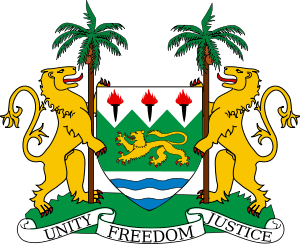Foreign relations of Sierra Leone
 |
| This article is part of a series on the politics and government of Sierra Leone |
|
Legislative
|
|
Sierra Leone maintains formal relations with many Western nations.[1] It also maintains diplomatic relations with the former Soviet Bloc countries as well as with the People's Republic of China.
The government maintains 16 embassies and high commissions across the world.[2]
Multilateral membership
Former President Stevens' government had sought closer relations with West African countries under the Economic Community of West African States (ECOWAS).[3] The present government is continuing this effort.
Sierra Leone is a member of the United Nations and its specialized agencies, the Commonwealth, the African Union, the Economic Community of West African States (ECOWAS), the African Development Bank (AFDB), the Mano River Union (MRU), the Organisation of Islamic Cooperation (OIC), and the Non-Aligned Movement (NAM).
Sierra Leone is also a member of the International Criminal Court with a Bilateral Immunity Agreement of protection for the US-military (as covered under Article 98).
Sierra Leone is a member state of the Commonwealth of Nations.
Bilateral relations
China
China and Sierra Leone established diplomatic relations on July 29, 1971.[4]
South Korea
Establishment of Diplomatic Relations between the Republic of Korea and the Republic of Sierra Leone is June 25, 1962.[5]
United States
U.S. relations with Sierra Leone began with missionary activities in the 19th century. In 1959, the U.S. opened a consulate in Freetown and elevated it to embassy status when Sierra Leone became independent in 1961. U.S.-Sierra Leone relations today are cordial, with ethnic ties between groups in the two countries receiving increasing historical interest. Many thousands of Sierra Leoneans reside in the United States.
In fiscal year 2006, total U.S. bilateral aid to Sierra Leone in all categories were $29.538 million. U.S. assistance focused on the consolidation of peace, democracy and human rights, health education, particularly combating HIV/AIDS, and human resources development.
Currently, the Principal U.S. Official in Sierra Leone is Chargé d'Affaires Glenn Fedzer [6] Sierra Leone's Ambassador to the U.S. is H. E. Bockari Kortu Stevens and the Sierra Leone embassy is located in Washington.[7]
![]() This article incorporates public domain material from the United States Department of State website http://www.state.gov/r/pa/ei/bgn/index.htm (Background Notes).
This article incorporates public domain material from the United States Department of State website http://www.state.gov/r/pa/ei/bgn/index.htm (Background Notes).
International Disputes
Large UN peacekeeping presence ended civil war, however rebel gang fighting, ethnic rivalries, illegal diamond trading, corruption, and refugees spill over into neighboring states that are beset with their own civil disorders, refugees, and violence.
See also
References
- ↑ http://www.embassiesabroad.com/embassies-in/SierraLeone
- ↑ http://www.visitsierraleone.org/Visiting-Sierra-Leone/Before-you-travel/Sierra-Leone-Diplomatic-and-Consular-Missions-Abroad.html
- ↑ http://www.nationsencyclopedia.com/World-Leaders-2003/Sierra-Leone-FOREIGN-POLICY.html
- ↑ http://www.china.org.cn/english/features/focac/183425.htm
- ↑ http://www.mofa.go.kr/ENG/countries/middleeast/countries/20070824/1_24485.jsp?menu=m_30_50
- ↑ Embassy of the United States in Sierra Leone
- ↑ "Embassy of Sierra Leone". Sierra Leone government. 2008-04-11. Retrieved 2008-04-13.
External links
- United Nations Integrated Office in Sierra Leone
- "Ministry of Foreign Affairs and International Cooperation at the Sierra Leone Encyclopedia 2006"